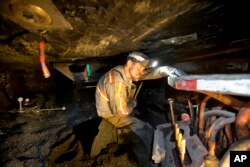The father of three and former coal miner choked back tears as he told Democratic presidential candidate Hillary Clinton how her remarks against the coal industry had impacted him.
“I wanted her to have the faces that go with the decisions and the comments of, ‘We are going to put a lot of coal miners and coal companies out of business’, and I wanted her to see the faces of those really affected by that. I showed her pictures of my children,” Bo Copley told VOA.
A resident of Delbarton, in the U.S. state of West Virginia, Copley worked in the coal industry for 11 years before he was laid off last September.
“My dad worked in the coal mine, my grandfather actually owned a small mine at some point. That’s just a way of life around here,” he said.
The 39-year-old says during last week’s roundtable discussion in Williamson, West Virginia, Clinton told him her words about putting coal companies out of business were taken out of context.
Copley says it was clear Clinton’s focus is on the clean energy industry.
His issue is that these newer technologies have not been brought into states like coal-dependent West Virginia to replace the jobs being lost.
Many coal-dependent communities blame President Barack Obama for the situation. They say his administration’s emphasis on fighting climate change, including approving stringent environmental regulations on coal-fired power plants, have chipped away at the industry’s profit margins.
“The regulations that have been put on the coal industry and the lack of regulations on other forms of energy have really forced coal out of the market from where it used to be,” Copley said. “That’s one of the reasons why there is a downturn in the market and the reason why people like me have lost their jobs.”
Coal country
The fortunes of West Virginia have been tied to coal production since it was first discovered in 1742, and coal has been tied to the United States throughout its history.
Coal was the primary form of energy produced in the United States until the 1950's when the petroleum and natural gas industries came to dominate the market.
Coal still accounts for more than 30 percent of all energy produced in the United States, and West Virginia is the second largest U.S. producer. Only the state of Wyoming produces more.
Coal consumption continued to rise in the U.S. until 2010 and there has been a renewed focus on the environmental ramifications of the industry.
Coal is dirty, by far the world's largest generator of the gases that drive climate change. It's also expensive; oil and natural gas are cheap in comparison.
Extraction can also be an ugly process. These days, most coal doesn't come out of mines; it comes from surface mining in which overlying dirt is moved away to get to the coal underneath. Environmentalists say the impact of this mining, in the form of poisonous runoff, can be profound and can ruin an otherwise pristine landscape.
All of this, along with the low price of natural gas and the drop in demand for fossil fuels in general, have sent the coal industry into freefall.
The number of people working in the coal industry has dropped by nearly 50 percent since 2012.
Copley says he is looking for work and in the meantime, his wife’s photography business is supporting his family of five.
As West Virginians head to the polls on primary day, the registered Republican says he wants to send a message to politicians that his community still matters. More importantly, Copley says he tries to instill in his young nephew the importance of casting a ballot.
“If you don’t vote, you don’t have a right to complain about what happens in this country,” he said.






